Organisational Behaviour Report: Hilton Hotel Case Study Analysis
VerifiedAdded on 2020/06/05
|10
|2485
|419
Report
AI Summary
This report provides an in-depth analysis of organisational behaviour, using Hilton Hotels as a case study. It explores the influence of culture, politics, and power on employee behaviour, examining how these factors impact the workplace. The report delves into motivational theories, including Maslow's hierarchy of needs, Alderfer's ERG theory, and Herzberg's two-factor theory, evaluating their application in motivating individuals and teams. Furthermore, it discusses the importance of cooperation, effective communication, and team goal alignment for achieving organisational objectives. Finally, the report applies key organisational behaviour concepts such as individual differences, perceptions, and human dignity to the Hilton Hotels context, concluding with recommendations for fostering a positive and productive work environment.
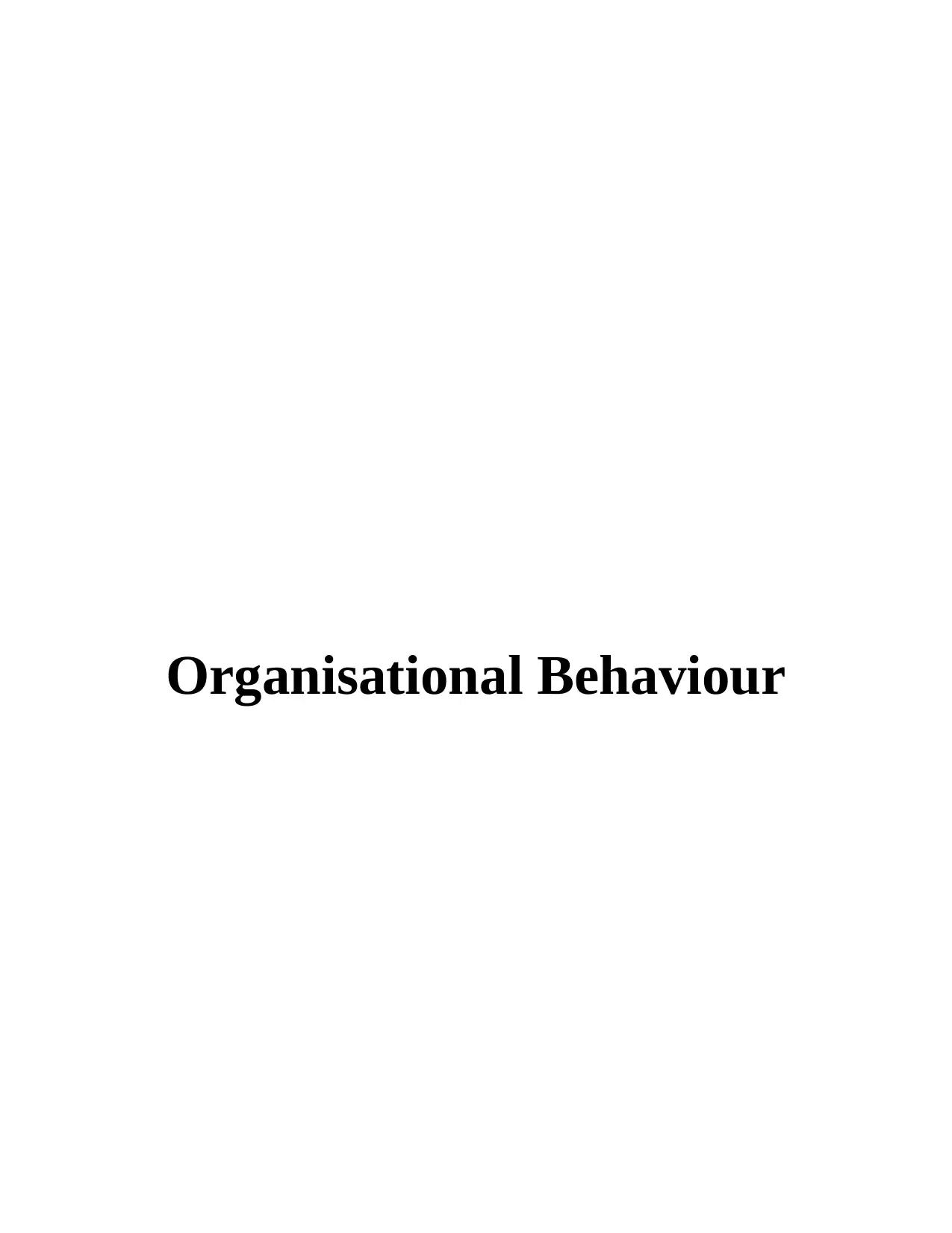
Organisational Behaviour
Paraphrase This Document
Need a fresh take? Get an instant paraphrase of this document with our AI Paraphraser
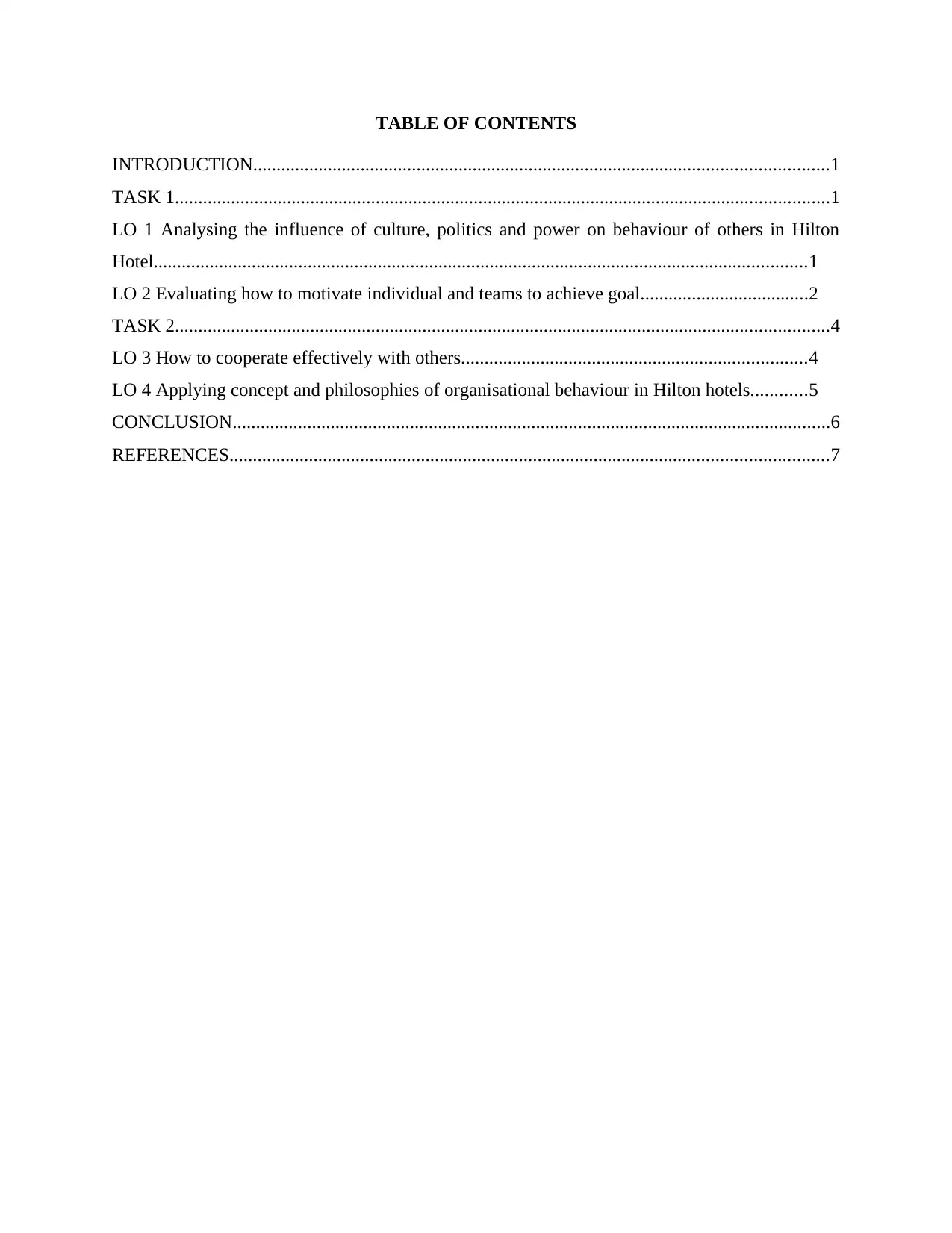
TABLE OF CONTENTS
INTRODUCTION...........................................................................................................................1
TASK 1............................................................................................................................................1
LO 1 Analysing the influence of culture, politics and power on behaviour of others in Hilton
Hotel............................................................................................................................................1
LO 2 Evaluating how to motivate individual and teams to achieve goal....................................2
TASK 2............................................................................................................................................4
LO 3 How to cooperate effectively with others..........................................................................4
LO 4 Applying concept and philosophies of organisational behaviour in Hilton hotels............5
CONCLUSION................................................................................................................................6
REFERENCES................................................................................................................................7
INTRODUCTION...........................................................................................................................1
TASK 1............................................................................................................................................1
LO 1 Analysing the influence of culture, politics and power on behaviour of others in Hilton
Hotel............................................................................................................................................1
LO 2 Evaluating how to motivate individual and teams to achieve goal....................................2
TASK 2............................................................................................................................................4
LO 3 How to cooperate effectively with others..........................................................................4
LO 4 Applying concept and philosophies of organisational behaviour in Hilton hotels............5
CONCLUSION................................................................................................................................6
REFERENCES................................................................................................................................7
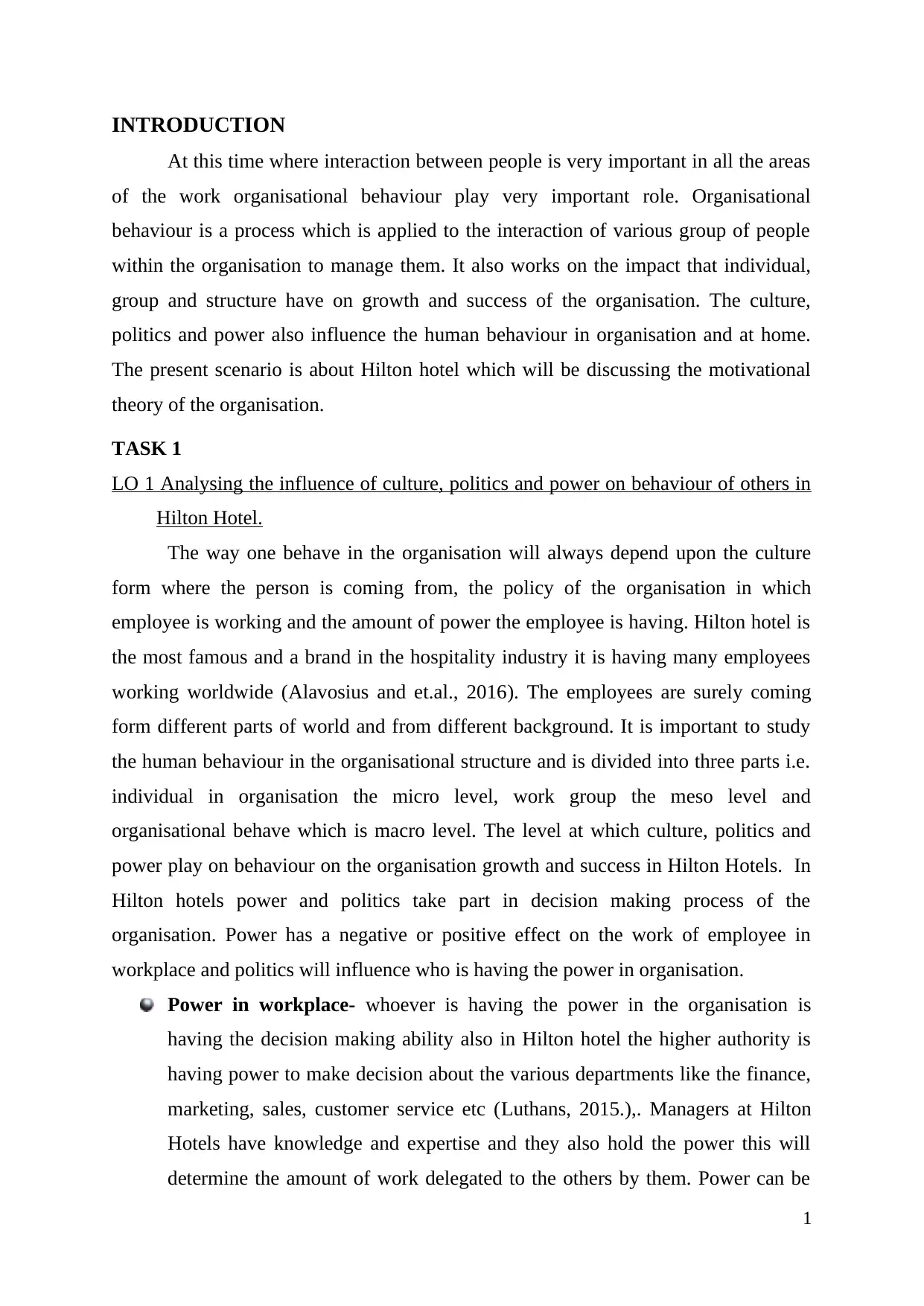
INTRODUCTION
At this time where interaction between people is very important in all the areas
of the work organisational behaviour play very important role. Organisational
behaviour is a process which is applied to the interaction of various group of people
within the organisation to manage them. It also works on the impact that individual,
group and structure have on growth and success of the organisation. The culture,
politics and power also influence the human behaviour in organisation and at home.
The present scenario is about Hilton hotel which will be discussing the motivational
theory of the organisation.
TASK 1
LO 1 Analysing the influence of culture, politics and power on behaviour of others in
Hilton Hotel.
The way one behave in the organisation will always depend upon the culture
form where the person is coming from, the policy of the organisation in which
employee is working and the amount of power the employee is having. Hilton hotel is
the most famous and a brand in the hospitality industry it is having many employees
working worldwide (Alavosius and et.al., 2016). The employees are surely coming
form different parts of world and from different background. It is important to study
the human behaviour in the organisational structure and is divided into three parts i.e.
individual in organisation the micro level, work group the meso level and
organisational behave which is macro level. The level at which culture, politics and
power play on behaviour on the organisation growth and success in Hilton Hotels. In
Hilton hotels power and politics take part in decision making process of the
organisation. Power has a negative or positive effect on the work of employee in
workplace and politics will influence who is having the power in organisation.
Power in workplace- whoever is having the power in the organisation is
having the decision making ability also in Hilton hotel the higher authority is
having power to make decision about the various departments like the finance,
marketing, sales, customer service etc (Luthans, 2015.),. Managers at Hilton
Hotels have knowledge and expertise and they also hold the power this will
determine the amount of work delegated to the others by them. Power can be
1
At this time where interaction between people is very important in all the areas
of the work organisational behaviour play very important role. Organisational
behaviour is a process which is applied to the interaction of various group of people
within the organisation to manage them. It also works on the impact that individual,
group and structure have on growth and success of the organisation. The culture,
politics and power also influence the human behaviour in organisation and at home.
The present scenario is about Hilton hotel which will be discussing the motivational
theory of the organisation.
TASK 1
LO 1 Analysing the influence of culture, politics and power on behaviour of others in
Hilton Hotel.
The way one behave in the organisation will always depend upon the culture
form where the person is coming from, the policy of the organisation in which
employee is working and the amount of power the employee is having. Hilton hotel is
the most famous and a brand in the hospitality industry it is having many employees
working worldwide (Alavosius and et.al., 2016). The employees are surely coming
form different parts of world and from different background. It is important to study
the human behaviour in the organisational structure and is divided into three parts i.e.
individual in organisation the micro level, work group the meso level and
organisational behave which is macro level. The level at which culture, politics and
power play on behaviour on the organisation growth and success in Hilton Hotels. In
Hilton hotels power and politics take part in decision making process of the
organisation. Power has a negative or positive effect on the work of employee in
workplace and politics will influence who is having the power in organisation.
Power in workplace- whoever is having the power in the organisation is
having the decision making ability also in Hilton hotel the higher authority is
having power to make decision about the various departments like the finance,
marketing, sales, customer service etc (Luthans, 2015.),. Managers at Hilton
Hotels have knowledge and expertise and they also hold the power this will
determine the amount of work delegated to the others by them. Power can be
1
⊘ This is a preview!⊘
Do you want full access?
Subscribe today to unlock all pages.

Trusted by 1+ million students worldwide
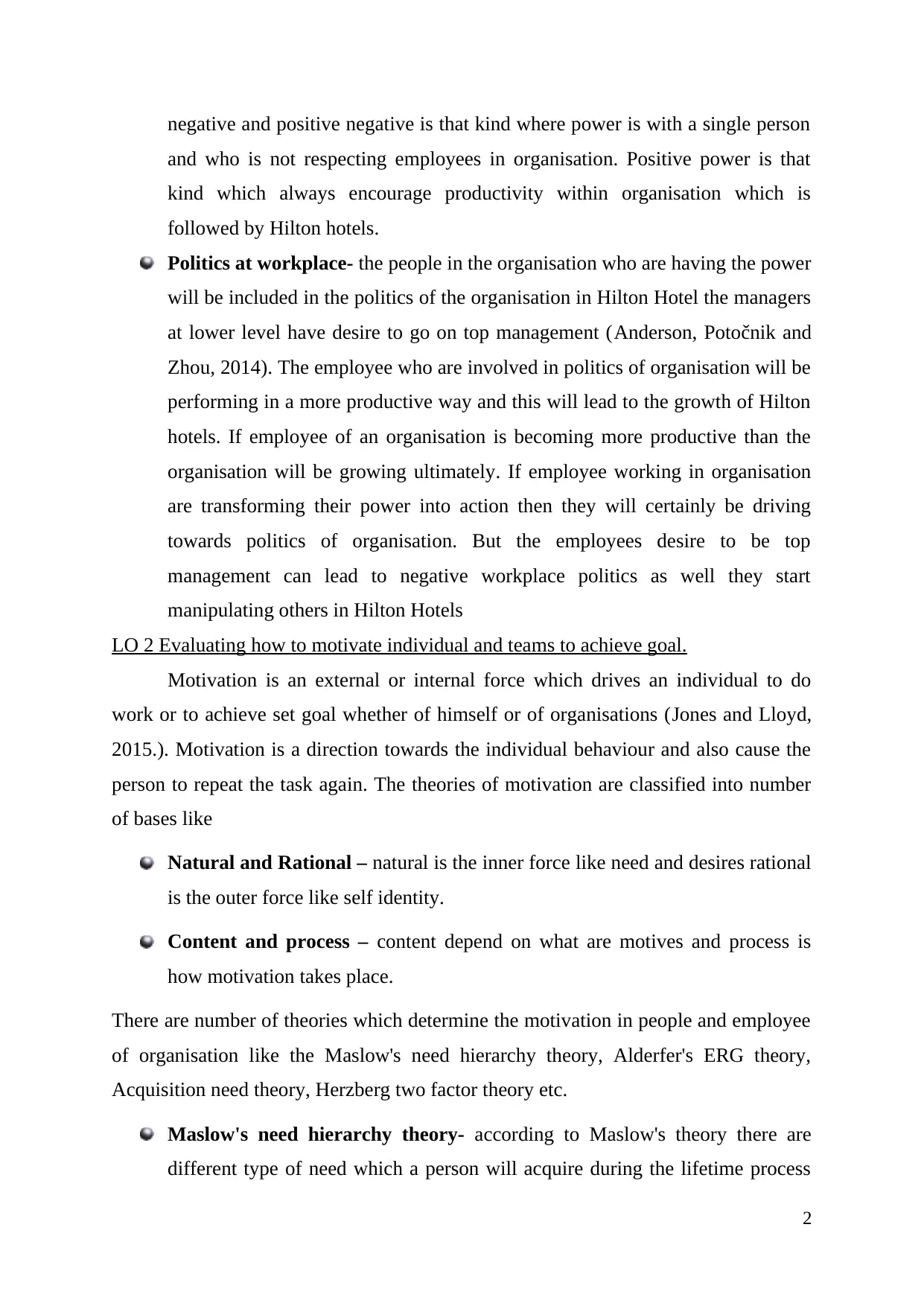
negative and positive negative is that kind where power is with a single person
and who is not respecting employees in organisation. Positive power is that
kind which always encourage productivity within organisation which is
followed by Hilton hotels.
Politics at workplace- the people in the organisation who are having the power
will be included in the politics of the organisation in Hilton Hotel the managers
at lower level have desire to go on top management (Anderson, Potočnik and
Zhou, 2014). The employee who are involved in politics of organisation will be
performing in a more productive way and this will lead to the growth of Hilton
hotels. If employee of an organisation is becoming more productive than the
organisation will be growing ultimately. If employee working in organisation
are transforming their power into action then they will certainly be driving
towards politics of organisation. But the employees desire to be top
management can lead to negative workplace politics as well they start
manipulating others in Hilton Hotels
LO 2 Evaluating how to motivate individual and teams to achieve goal.
Motivation is an external or internal force which drives an individual to do
work or to achieve set goal whether of himself or of organisations (Jones and Lloyd,
2015.). Motivation is a direction towards the individual behaviour and also cause the
person to repeat the task again. The theories of motivation are classified into number
of bases like
Natural and Rational – natural is the inner force like need and desires rational
is the outer force like self identity.
Content and process – content depend on what are motives and process is
how motivation takes place.
There are number of theories which determine the motivation in people and employee
of organisation like the Maslow's need hierarchy theory, Alderfer's ERG theory,
Acquisition need theory, Herzberg two factor theory etc.
Maslow's need hierarchy theory- according to Maslow's theory there are
different type of need which a person will acquire during the lifetime process
2
and who is not respecting employees in organisation. Positive power is that
kind which always encourage productivity within organisation which is
followed by Hilton hotels.
Politics at workplace- the people in the organisation who are having the power
will be included in the politics of the organisation in Hilton Hotel the managers
at lower level have desire to go on top management (Anderson, Potočnik and
Zhou, 2014). The employee who are involved in politics of organisation will be
performing in a more productive way and this will lead to the growth of Hilton
hotels. If employee of an organisation is becoming more productive than the
organisation will be growing ultimately. If employee working in organisation
are transforming their power into action then they will certainly be driving
towards politics of organisation. But the employees desire to be top
management can lead to negative workplace politics as well they start
manipulating others in Hilton Hotels
LO 2 Evaluating how to motivate individual and teams to achieve goal.
Motivation is an external or internal force which drives an individual to do
work or to achieve set goal whether of himself or of organisations (Jones and Lloyd,
2015.). Motivation is a direction towards the individual behaviour and also cause the
person to repeat the task again. The theories of motivation are classified into number
of bases like
Natural and Rational – natural is the inner force like need and desires rational
is the outer force like self identity.
Content and process – content depend on what are motives and process is
how motivation takes place.
There are number of theories which determine the motivation in people and employee
of organisation like the Maslow's need hierarchy theory, Alderfer's ERG theory,
Acquisition need theory, Herzberg two factor theory etc.
Maslow's need hierarchy theory- according to Maslow's theory there are
different type of need which a person will acquire during the lifetime process
2
Paraphrase This Document
Need a fresh take? Get an instant paraphrase of this document with our AI Paraphraser
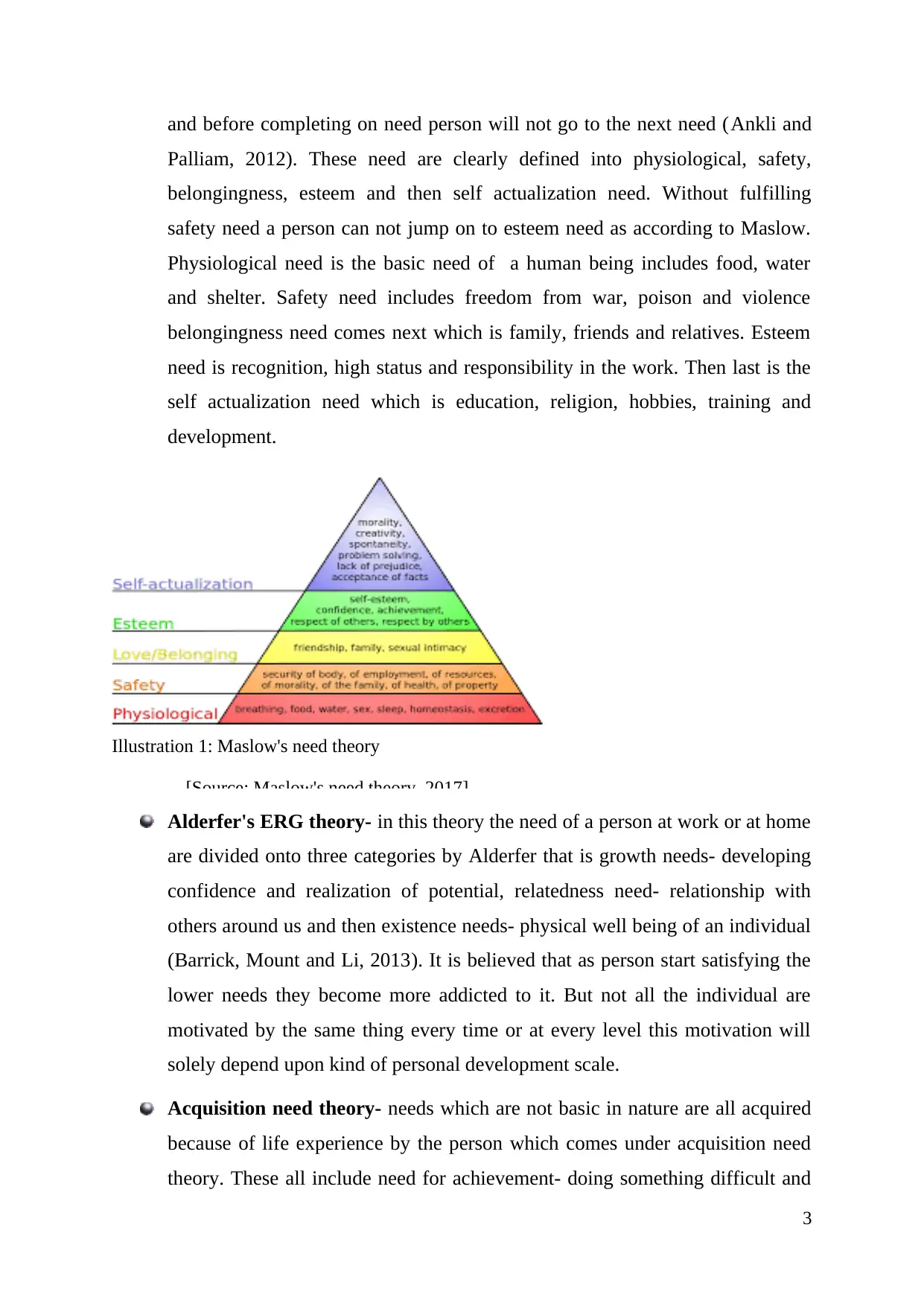
and before completing on need person will not go to the next need (Ankli and
Palliam, 2012). These need are clearly defined into physiological, safety,
belongingness, esteem and then self actualization need. Without fulfilling
safety need a person can not jump on to esteem need as according to Maslow.
Physiological need is the basic need of a human being includes food, water
and shelter. Safety need includes freedom from war, poison and violence
belongingness need comes next which is family, friends and relatives. Esteem
need is recognition, high status and responsibility in the work. Then last is the
self actualization need which is education, religion, hobbies, training and
development.
Illustration 1: Maslow's need theory
[Source: Maslow's need theory, 2017]
Alderfer's ERG theory- in this theory the need of a person at work or at home
are divided onto three categories by Alderfer that is growth needs- developing
confidence and realization of potential, relatedness need- relationship with
others around us and then existence needs- physical well being of an individual
(Barrick, Mount and Li, 2013). It is believed that as person start satisfying the
lower needs they become more addicted to it. But not all the individual are
motivated by the same thing every time or at every level this motivation will
solely depend upon kind of personal development scale.
Acquisition need theory- needs which are not basic in nature are all acquired
because of life experience by the person which comes under acquisition need
theory. These all include need for achievement- doing something difficult and
3
Palliam, 2012). These need are clearly defined into physiological, safety,
belongingness, esteem and then self actualization need. Without fulfilling
safety need a person can not jump on to esteem need as according to Maslow.
Physiological need is the basic need of a human being includes food, water
and shelter. Safety need includes freedom from war, poison and violence
belongingness need comes next which is family, friends and relatives. Esteem
need is recognition, high status and responsibility in the work. Then last is the
self actualization need which is education, religion, hobbies, training and
development.
Illustration 1: Maslow's need theory
[Source: Maslow's need theory, 2017]
Alderfer's ERG theory- in this theory the need of a person at work or at home
are divided onto three categories by Alderfer that is growth needs- developing
confidence and realization of potential, relatedness need- relationship with
others around us and then existence needs- physical well being of an individual
(Barrick, Mount and Li, 2013). It is believed that as person start satisfying the
lower needs they become more addicted to it. But not all the individual are
motivated by the same thing every time or at every level this motivation will
solely depend upon kind of personal development scale.
Acquisition need theory- needs which are not basic in nature are all acquired
because of life experience by the person which comes under acquisition need
theory. These all include need for achievement- doing something difficult and
3
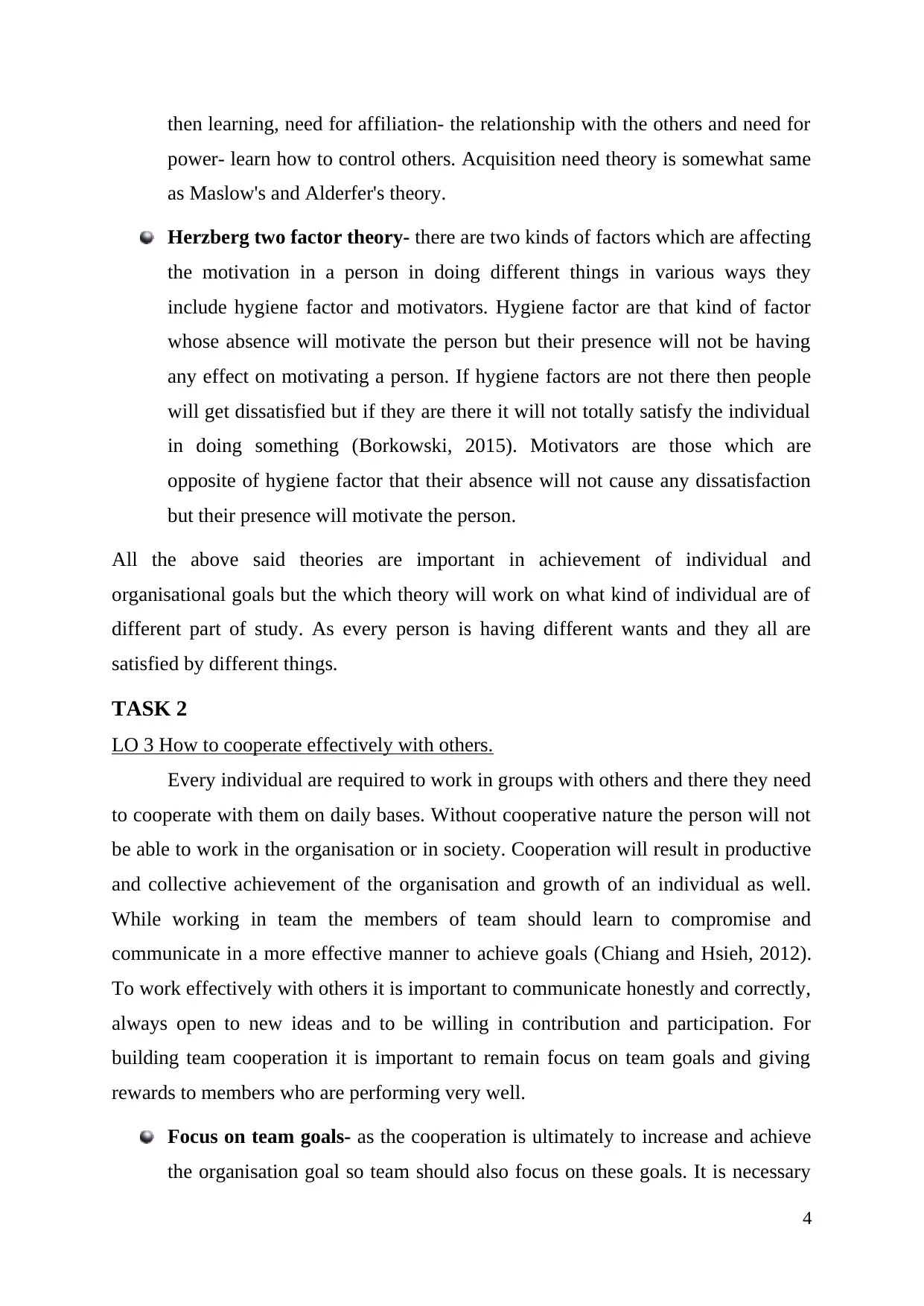
then learning, need for affiliation- the relationship with the others and need for
power- learn how to control others. Acquisition need theory is somewhat same
as Maslow's and Alderfer's theory.
Herzberg two factor theory- there are two kinds of factors which are affecting
the motivation in a person in doing different things in various ways they
include hygiene factor and motivators. Hygiene factor are that kind of factor
whose absence will motivate the person but their presence will not be having
any effect on motivating a person. If hygiene factors are not there then people
will get dissatisfied but if they are there it will not totally satisfy the individual
in doing something (Borkowski, 2015). Motivators are those which are
opposite of hygiene factor that their absence will not cause any dissatisfaction
but their presence will motivate the person.
All the above said theories are important in achievement of individual and
organisational goals but the which theory will work on what kind of individual are of
different part of study. As every person is having different wants and they all are
satisfied by different things.
TASK 2
LO 3 How to cooperate effectively with others.
Every individual are required to work in groups with others and there they need
to cooperate with them on daily bases. Without cooperative nature the person will not
be able to work in the organisation or in society. Cooperation will result in productive
and collective achievement of the organisation and growth of an individual as well.
While working in team the members of team should learn to compromise and
communicate in a more effective manner to achieve goals (Chiang and Hsieh, 2012).
To work effectively with others it is important to communicate honestly and correctly,
always open to new ideas and to be willing in contribution and participation. For
building team cooperation it is important to remain focus on team goals and giving
rewards to members who are performing very well.
Focus on team goals- as the cooperation is ultimately to increase and achieve
the organisation goal so team should also focus on these goals. It is necessary
4
power- learn how to control others. Acquisition need theory is somewhat same
as Maslow's and Alderfer's theory.
Herzberg two factor theory- there are two kinds of factors which are affecting
the motivation in a person in doing different things in various ways they
include hygiene factor and motivators. Hygiene factor are that kind of factor
whose absence will motivate the person but their presence will not be having
any effect on motivating a person. If hygiene factors are not there then people
will get dissatisfied but if they are there it will not totally satisfy the individual
in doing something (Borkowski, 2015). Motivators are those which are
opposite of hygiene factor that their absence will not cause any dissatisfaction
but their presence will motivate the person.
All the above said theories are important in achievement of individual and
organisational goals but the which theory will work on what kind of individual are of
different part of study. As every person is having different wants and they all are
satisfied by different things.
TASK 2
LO 3 How to cooperate effectively with others.
Every individual are required to work in groups with others and there they need
to cooperate with them on daily bases. Without cooperative nature the person will not
be able to work in the organisation or in society. Cooperation will result in productive
and collective achievement of the organisation and growth of an individual as well.
While working in team the members of team should learn to compromise and
communicate in a more effective manner to achieve goals (Chiang and Hsieh, 2012).
To work effectively with others it is important to communicate honestly and correctly,
always open to new ideas and to be willing in contribution and participation. For
building team cooperation it is important to remain focus on team goals and giving
rewards to members who are performing very well.
Focus on team goals- as the cooperation is ultimately to increase and achieve
the organisation goal so team should also focus on these goals. It is necessary
4
⊘ This is a preview!⊘
Do you want full access?
Subscribe today to unlock all pages.

Trusted by 1+ million students worldwide
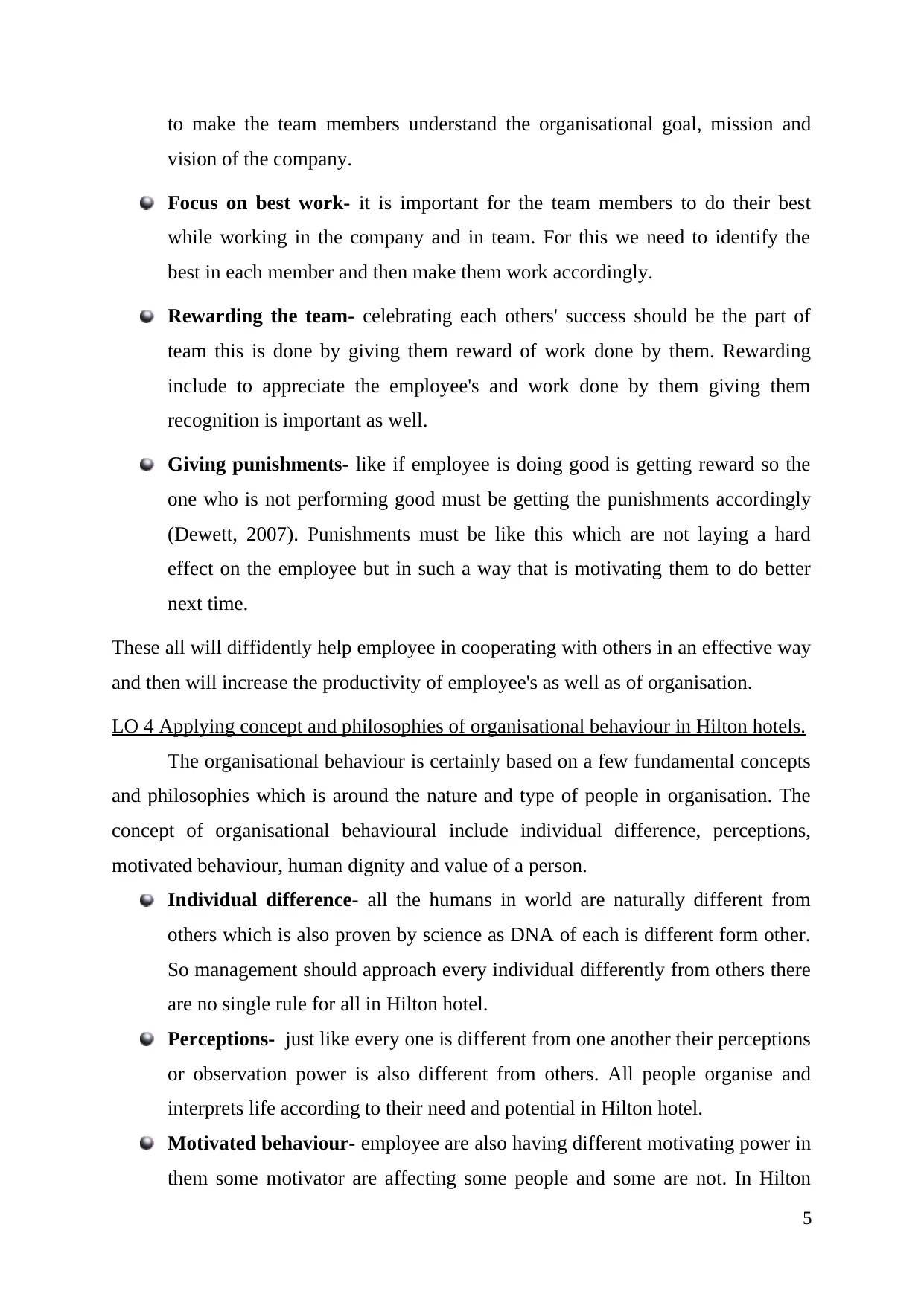
to make the team members understand the organisational goal, mission and
vision of the company.
Focus on best work- it is important for the team members to do their best
while working in the company and in team. For this we need to identify the
best in each member and then make them work accordingly.
Rewarding the team- celebrating each others' success should be the part of
team this is done by giving them reward of work done by them. Rewarding
include to appreciate the employee's and work done by them giving them
recognition is important as well.
Giving punishments- like if employee is doing good is getting reward so the
one who is not performing good must be getting the punishments accordingly
(Dewett, 2007). Punishments must be like this which are not laying a hard
effect on the employee but in such a way that is motivating them to do better
next time.
These all will diffidently help employee in cooperating with others in an effective way
and then will increase the productivity of employee's as well as of organisation.
LO 4 Applying concept and philosophies of organisational behaviour in Hilton hotels.
The organisational behaviour is certainly based on a few fundamental concepts
and philosophies which is around the nature and type of people in organisation. The
concept of organisational behavioural include individual difference, perceptions,
motivated behaviour, human dignity and value of a person.
Individual difference- all the humans in world are naturally different from
others which is also proven by science as DNA of each is different form other.
So management should approach every individual differently from others there
are no single rule for all in Hilton hotel.
Perceptions- just like every one is different from one another their perceptions
or observation power is also different from others. All people organise and
interprets life according to their need and potential in Hilton hotel.
Motivated behaviour- employee are also having different motivating power in
them some motivator are affecting some people and some are not. In Hilton
5
vision of the company.
Focus on best work- it is important for the team members to do their best
while working in the company and in team. For this we need to identify the
best in each member and then make them work accordingly.
Rewarding the team- celebrating each others' success should be the part of
team this is done by giving them reward of work done by them. Rewarding
include to appreciate the employee's and work done by them giving them
recognition is important as well.
Giving punishments- like if employee is doing good is getting reward so the
one who is not performing good must be getting the punishments accordingly
(Dewett, 2007). Punishments must be like this which are not laying a hard
effect on the employee but in such a way that is motivating them to do better
next time.
These all will diffidently help employee in cooperating with others in an effective way
and then will increase the productivity of employee's as well as of organisation.
LO 4 Applying concept and philosophies of organisational behaviour in Hilton hotels.
The organisational behaviour is certainly based on a few fundamental concepts
and philosophies which is around the nature and type of people in organisation. The
concept of organisational behavioural include individual difference, perceptions,
motivated behaviour, human dignity and value of a person.
Individual difference- all the humans in world are naturally different from
others which is also proven by science as DNA of each is different form other.
So management should approach every individual differently from others there
are no single rule for all in Hilton hotel.
Perceptions- just like every one is different from one another their perceptions
or observation power is also different from others. All people organise and
interprets life according to their need and potential in Hilton hotel.
Motivated behaviour- employee are also having different motivating power in
them some motivator are affecting some people and some are not. In Hilton
5
Paraphrase This Document
Need a fresh take? Get an instant paraphrase of this document with our AI Paraphraser
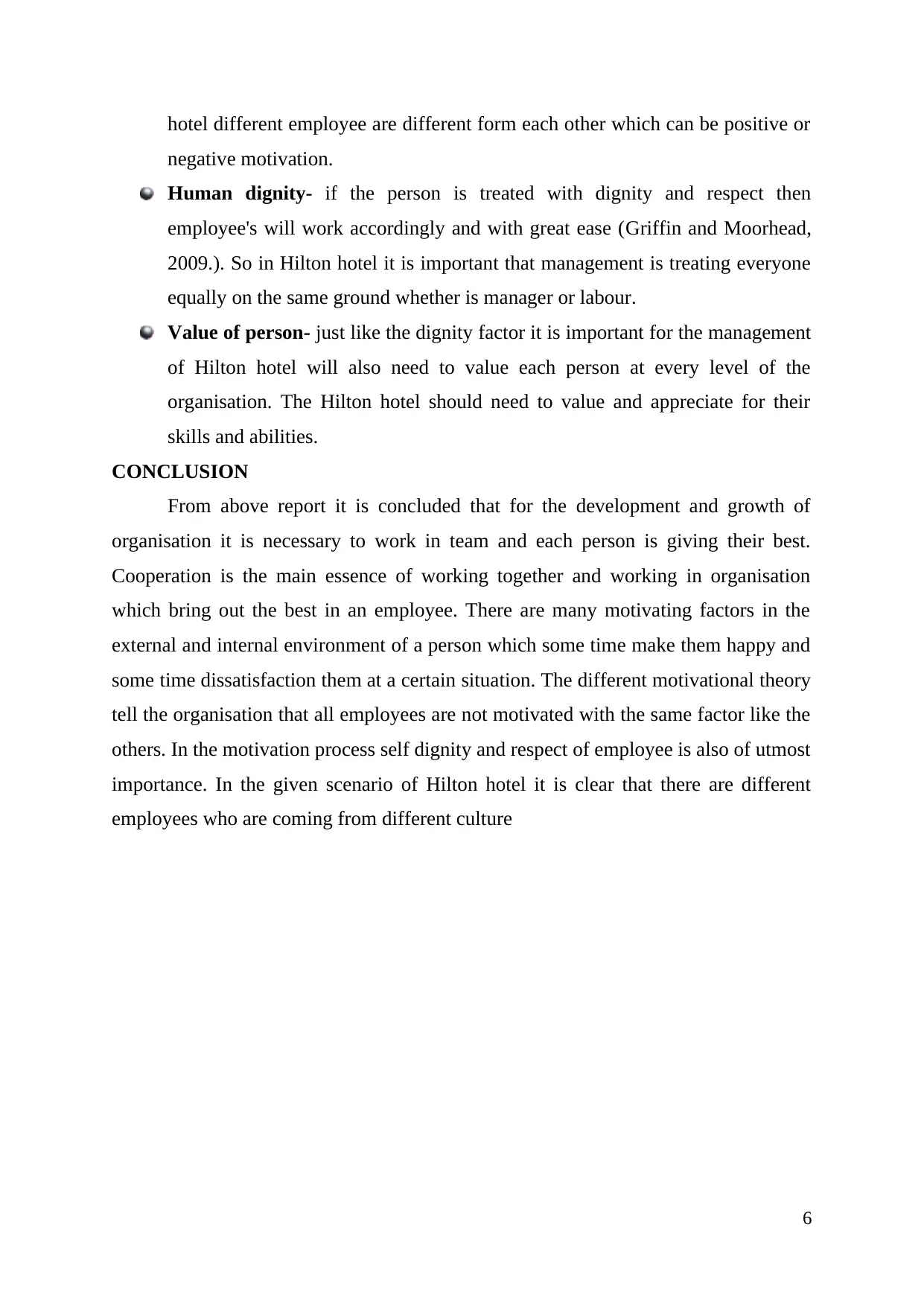
hotel different employee are different form each other which can be positive or
negative motivation.
Human dignity- if the person is treated with dignity and respect then
employee's will work accordingly and with great ease (Griffin and Moorhead,
2009.). So in Hilton hotel it is important that management is treating everyone
equally on the same ground whether is manager or labour.
Value of person- just like the dignity factor it is important for the management
of Hilton hotel will also need to value each person at every level of the
organisation. The Hilton hotel should need to value and appreciate for their
skills and abilities.
CONCLUSION
From above report it is concluded that for the development and growth of
organisation it is necessary to work in team and each person is giving their best.
Cooperation is the main essence of working together and working in organisation
which bring out the best in an employee. There are many motivating factors in the
external and internal environment of a person which some time make them happy and
some time dissatisfaction them at a certain situation. The different motivational theory
tell the organisation that all employees are not motivated with the same factor like the
others. In the motivation process self dignity and respect of employee is also of utmost
importance. In the given scenario of Hilton hotel it is clear that there are different
employees who are coming from different culture
6
negative motivation.
Human dignity- if the person is treated with dignity and respect then
employee's will work accordingly and with great ease (Griffin and Moorhead,
2009.). So in Hilton hotel it is important that management is treating everyone
equally on the same ground whether is manager or labour.
Value of person- just like the dignity factor it is important for the management
of Hilton hotel will also need to value each person at every level of the
organisation. The Hilton hotel should need to value and appreciate for their
skills and abilities.
CONCLUSION
From above report it is concluded that for the development and growth of
organisation it is necessary to work in team and each person is giving their best.
Cooperation is the main essence of working together and working in organisation
which bring out the best in an employee. There are many motivating factors in the
external and internal environment of a person which some time make them happy and
some time dissatisfaction them at a certain situation. The different motivational theory
tell the organisation that all employees are not motivated with the same factor like the
others. In the motivation process self dignity and respect of employee is also of utmost
importance. In the given scenario of Hilton hotel it is clear that there are different
employees who are coming from different culture
6
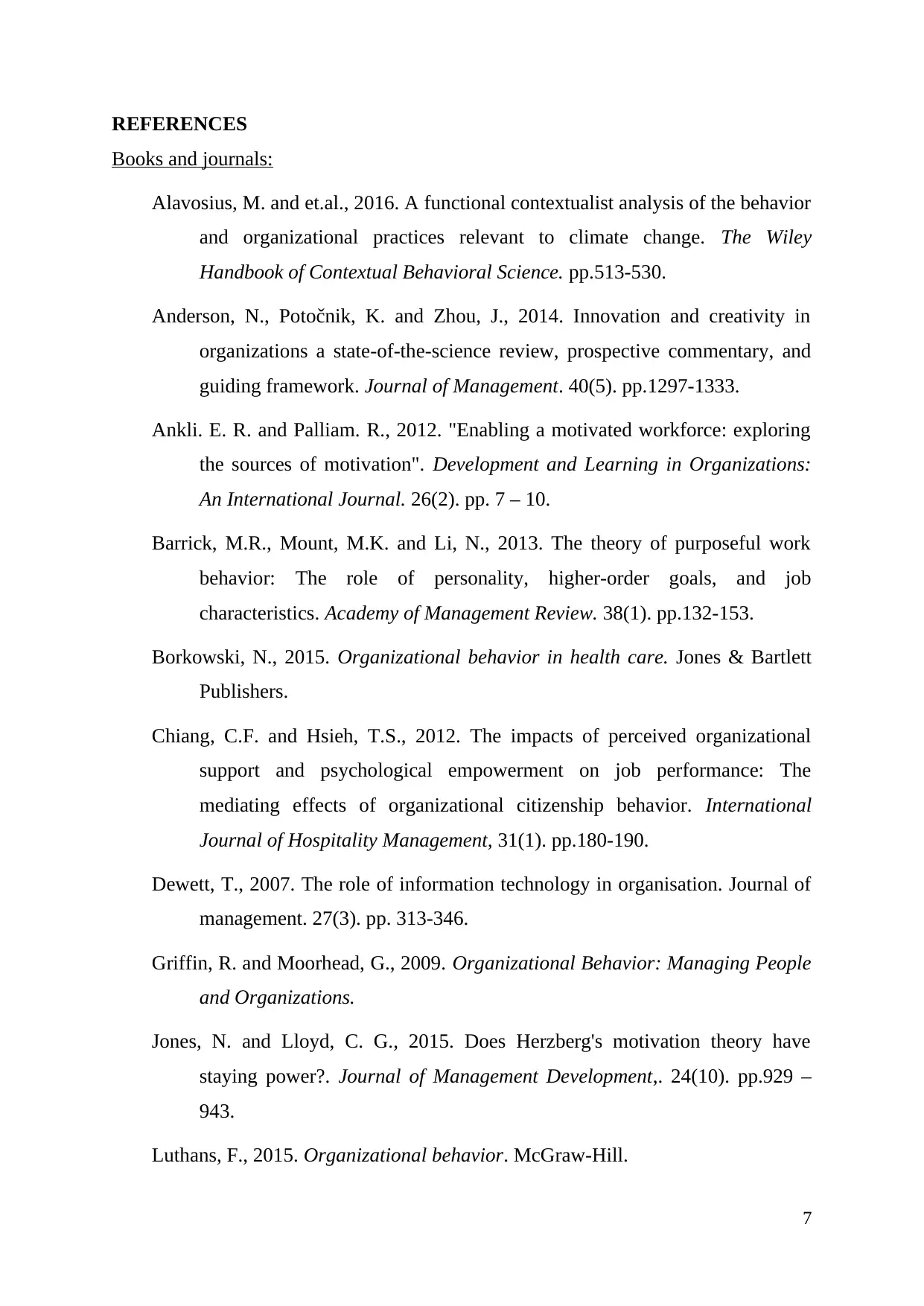
REFERENCES
Books and journals:
Alavosius, M. and et.al., 2016. A functional contextualist analysis of the behavior
and organizational practices relevant to climate change. The Wiley
Handbook of Contextual Behavioral Science. pp.513-530.
Anderson, N., Potočnik, K. and Zhou, J., 2014. Innovation and creativity in
organizations a state-of-the-science review, prospective commentary, and
guiding framework. Journal of Management. 40(5). pp.1297-1333.
Ankli. E. R. and Palliam. R., 2012. "Enabling a motivated workforce: exploring
the sources of motivation". Development and Learning in Organizations:
An International Journal. 26(2). pp. 7 – 10.
Barrick, M.R., Mount, M.K. and Li, N., 2013. The theory of purposeful work
behavior: The role of personality, higher-order goals, and job
characteristics. Academy of Management Review. 38(1). pp.132-153.
Borkowski, N., 2015. Organizational behavior in health care. Jones & Bartlett
Publishers.
Chiang, C.F. and Hsieh, T.S., 2012. The impacts of perceived organizational
support and psychological empowerment on job performance: The
mediating effects of organizational citizenship behavior. International
Journal of Hospitality Management, 31(1). pp.180-190.
Dewett, T., 2007. The role of information technology in organisation. Journal of
management. 27(3). pp. 313-346.
Griffin, R. and Moorhead, G., 2009. Organizational Behavior: Managing People
and Organizations.
Jones, N. and Lloyd, C. G., 2015. Does Herzberg's motivation theory have
staying power?. Journal of Management Development,. 24(10). pp.929 –
943.
Luthans, F., 2015. Organizational behavior. McGraw-Hill.
7
Books and journals:
Alavosius, M. and et.al., 2016. A functional contextualist analysis of the behavior
and organizational practices relevant to climate change. The Wiley
Handbook of Contextual Behavioral Science. pp.513-530.
Anderson, N., Potočnik, K. and Zhou, J., 2014. Innovation and creativity in
organizations a state-of-the-science review, prospective commentary, and
guiding framework. Journal of Management. 40(5). pp.1297-1333.
Ankli. E. R. and Palliam. R., 2012. "Enabling a motivated workforce: exploring
the sources of motivation". Development and Learning in Organizations:
An International Journal. 26(2). pp. 7 – 10.
Barrick, M.R., Mount, M.K. and Li, N., 2013. The theory of purposeful work
behavior: The role of personality, higher-order goals, and job
characteristics. Academy of Management Review. 38(1). pp.132-153.
Borkowski, N., 2015. Organizational behavior in health care. Jones & Bartlett
Publishers.
Chiang, C.F. and Hsieh, T.S., 2012. The impacts of perceived organizational
support and psychological empowerment on job performance: The
mediating effects of organizational citizenship behavior. International
Journal of Hospitality Management, 31(1). pp.180-190.
Dewett, T., 2007. The role of information technology in organisation. Journal of
management. 27(3). pp. 313-346.
Griffin, R. and Moorhead, G., 2009. Organizational Behavior: Managing People
and Organizations.
Jones, N. and Lloyd, C. G., 2015. Does Herzberg's motivation theory have
staying power?. Journal of Management Development,. 24(10). pp.929 –
943.
Luthans, F., 2015. Organizational behavior. McGraw-Hill.
7
⊘ This is a preview!⊘
Do you want full access?
Subscribe today to unlock all pages.

Trusted by 1+ million students worldwide
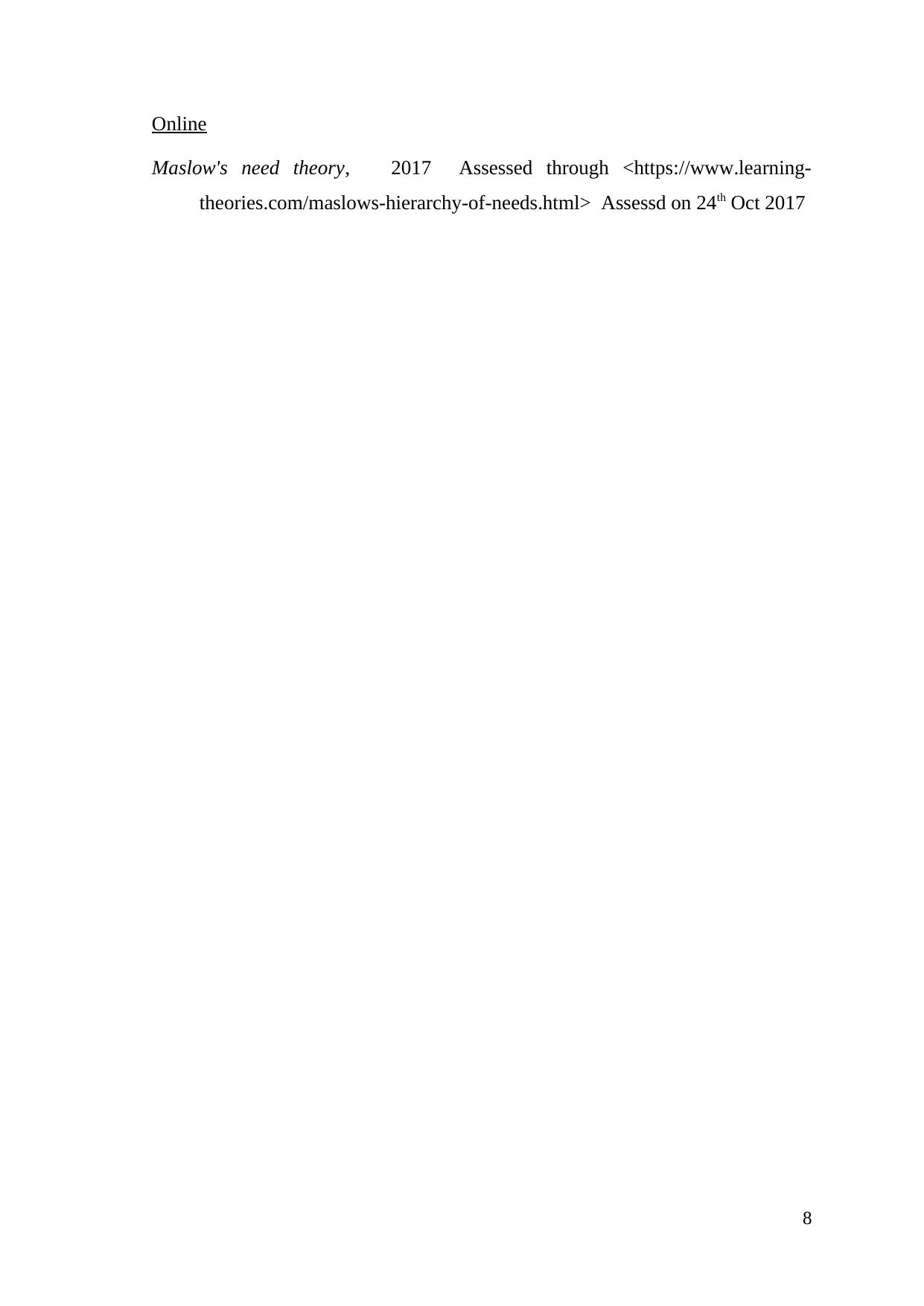
Online
Maslow's need theory, 2017 Assessed through <https://www.learning-
theories.com/maslows-hierarchy-of-needs.html> Assessd on 24th Oct 2017
8
Maslow's need theory, 2017 Assessed through <https://www.learning-
theories.com/maslows-hierarchy-of-needs.html> Assessd on 24th Oct 2017
8
1 out of 10
Related Documents
Your All-in-One AI-Powered Toolkit for Academic Success.
+13062052269
info@desklib.com
Available 24*7 on WhatsApp / Email
![[object Object]](/_next/static/media/star-bottom.7253800d.svg)
Unlock your academic potential
Copyright © 2020–2026 A2Z Services. All Rights Reserved. Developed and managed by ZUCOL.





